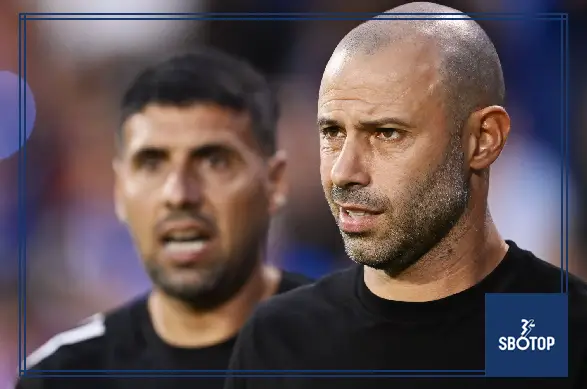In the balmy heat of South Florida, under the gleaming lights of Chase Stadium, Lionel Messi reminded the world—once again—that the football pitch is where he belongs. With two goals, an assist, and a mesmerizing 90-minute display of vintage brilliance, the 37-year-old Inter Miami talisman orchestrated a thrilling 4-1 comeback win over CF Montreal in Major League Soccer. But the bigger story of the night wasn’t just about his performance—it was about the decision to let him play the full match.
Amid concern from media and fans over the physical toll on Messi, Inter Miami assistant coach Javier Mascherano stepped in with a simple yet profound explanation:
“Leo is happiest when he’s playing football.”
That quote encapsulates the spirit not only of the player but of an entire footballing philosophy. This article explores the reasons behind Messi’s full 90-minute appearance, the logic of Mascherano’s management, the implications for Inter Miami, and what it reveals about Messi’s enduring love for the beautiful game.
Mascherano Responds “Leo’s Joy Is on the Pitch”
After the match, Javier Mascherano—filling in for Gerardo Martino, who remained in recovery after a minor medical procedure—faced a barrage of questions from reporters.
Why risk fatigue? Why not rest a 37-year-old returning from a demanding international tournament? Could Messi burn out?
Mascherano, who knows Messi better than most—having shared a locker room with him for over a decade with Argentina and Barcelona—didn’t hesitate.
“Leo is not just a player; he’s a rhythm, a mindset. Taking him off when he’s feeling the game is like silencing a song mid-chorus.”
He elaborated further:
“We spoke before the match. He told us how fresh he felt, how much he missed playing in front of these fans. And when Leo is in that state, you don’t interrupt it—you honor it.”
This wasn’t just about minutes on a clock or sports science—it was about emotional energy, momentum, and joy.
The Messi-Mascherano Connection Trust Built Over Time
Mascherano’s words carry weight. The former Argentina captain is more than an assistant coach—he’s a confidante, a conduit between the old-school Messi and the tactical framework of modern MLS football. Their relationship is rooted in shared battles on the international stage, from the heartbreak of Copa America finals to the triumphs of World Cup qualifying marathons.
When Mascherano says Messi knows his body better than anyone, he means it. Throughout his career, Messi has defied conventional workload metrics. Even in his mid-30s, he continues to deliver match-defining contributions week after week, all while avoiding major injury setbacks.
Mascherano’s decision to leave him on for the full 90 wasn’t made on impulse. It was made through mutual understanding—a coach trusting his star player to self-regulate.
Understanding Messi’s Motivation
Let’s go deeper into what makes Messi tick. Despite a trophy cabinet bursting with accolades, Messi’s relationship with football remains childlike in its purity. He doesn’t play to pad stats or break records (though he does both effortlessly)—he plays to feel the game.
And that’s what was on full display against Montreal.
After a short layoff and a grueling travel schedule post-Club World Cup, Messi had every excuse to ease his way back. But instead, he chose to immerse himself fully, creating, scoring, and inspiring.
“When Messi is playing with joy, it’s contagious. The team flows. The fans rise. The game sings,” said Mascherano.
This mindset is key to why Messi continues to excel in MLS, despite the league’s physicality and his advancing age.
Fan Reaction “We Came to See Messi”
At Chase Stadium, the 21,000-strong crowd made their voices heard. Every Messi touch brought cheers; every burst of acceleration brought fans to their feet. As the final whistle blew, chants of “¡Messi! ¡Messi! ¡Messi!” echoed through the humid Florida night.
Fans didn’t just want a cameo. They didn’t come for a 60-minute shift. They came to see Leo at full flight.
Social media was quick to support Mascherano’s decision:
- “We paid top dollar. Let the man play. He’s happy, we’re happy.”
- “Messi doesn’t need rest, he’s a machine when he’s having fun.”
- “We’re witnessing history. Don’t bench joy.”
Inter Miami knows it has something special—a global icon who plays with the hunger of a debutant.
The Bigger Picture Inter Miami’s Playoff Push
The Herons’ win over Montreal wasn’t just a spectacle—it was strategic. Miami is currently battling for a top-six spot in the Eastern Conference, with a congested mid-table race.
Every point matters, and with Messi orchestrating things, Inter Miami’s form trajectory has shifted upward.
Since Messi’s arrival in MLS:
- Inter Miami win rate with Messi: 72%
- Without Messi: 41%
- Average goals scored per match with Messi: 2.6
- Without Messi: 1.3
Mascherano isn’t playing him to appease fans—he’s playing him because Messi is the heartbeat of their system.
What Other Coaches Think
Rival coaches have taken notice. CF Montreal’s manager Laurent Courtois, post-match, acknowledged:
“We thought we could tire him out, press him out of the game. But he kept growing stronger. When he’s in that rhythm, you’re playing against time as much as against Messi.”
This sentiment is echoed across MLS, where coaches now plan entire match strategies around limiting Messi’s influence—and often fail.
The Messi Effect on Teammates
Messi’s full-game presence does more than win matches—it elevates everyone around him:
- Luis Suárez: Better movement and chemistry when Messi is pulling defenders.
- Jordi Alba: Becomes a second playmaker with Messi opening lanes.
- Cremaschi: Grows in confidence, knowing Messi trusts him to take risks.
- Callender and the back line: Less pressured when the team holds more possession thanks to Messi’s control.
Leaving Messi on for 90 minutes isn’t just about him—it’s about amplifying the collective.
Mascherano’s Coaching Philosophy
This game offered more than just insight into Messi’s mindset—it was a window into Mascherano’s future as a coach.
Since joining Martino’s staff, Mascherano has evolved from tactical assistant to in-game decision-maker, especially in moments when Martino is unavailable. Against Montreal, he showed:
- Emotional intelligence: Trusting Messi without overanalyzing.
- Man management: Rotating others wisely while honoring Messi’s rhythm.
- Game reading: Adjusting pressing schemes after conceding early.
His quote, “Leo’s joy is on the pitch,” speaks to his philosophy—footballers, especially legends, play best when they’re free to feel.
What’s Next for Messi and Inter Miami
With Inter Miami’s fixture list heating up, decisions about Messi’s minutes will remain a hot topic. In the next 15 days, they face:
- Atlanta United (Home)
- Philadelphia Union (Away)
- New York Red Bulls (Home)
- Orlando City (Away)
Mascherano hinted at rotation but emphasized that “Messi will always play if he feels good.”
With the MLS All-Star Game and the Leagues Cup also on the horizon, fitness management will be crucial—but so will momentum.
Also Read:










